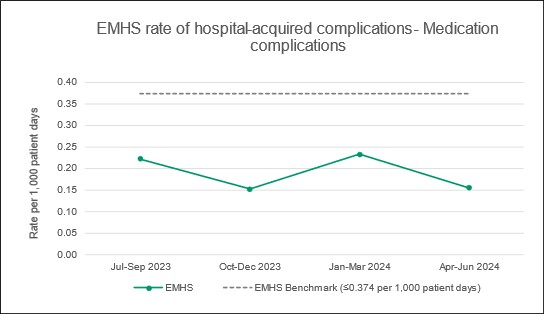Hospital-acquired complications – Medication complications
Medicines are the most common treatment used in health care and contribute to significant improvements in health when used appropriately. However, the use of medicines in complex healthcare environments is prone to errors and adverse events.
Medication complications may indicate a failure in the medication management process that leads to, or has the potential to lead to, harm to the patient. Hospital-acquired medication complications prolong the length of hospitalisation, which impacts on patients and their families.
Medication complications can occur when:
- choosing a medicine
- writing the prescription
- preparing or manufacturing the medication
- dispensing the medication
- administering or taking the medication
- monitoring post-administration of the medication to the patient.
Measuring Hospital-acquired complications – Medication complications
Healthcare commonly uses rates to measure complications such as these. The number of patients who had a hospital-acquired medication complication during their hospital stay per 1,000 patient days.
How do we measure up
The graph below shows the combined medication related incidents rate for the EMHS hospitals:
- Armadale Health Service
- Kalamunda Hospital
- Bentley Hospital
- Royal Perth Hospital
- St John of God Midland Public Hospital
Chart: Rate of hospital-acquired medication complications.

What the figures mean
The benchmark is less than or equal to 0.374 hospital-acquired medication complications per 1,000 patient days. A rate lower than the benchmark is desirable.
EMHS results have been better than the benchmark in all of the last four quarters.

